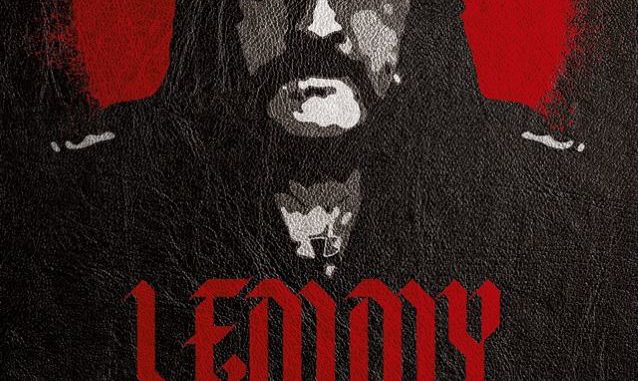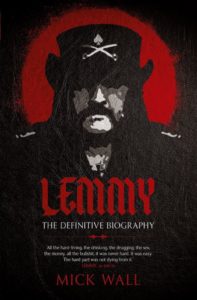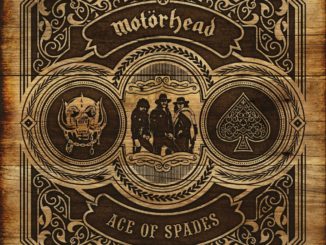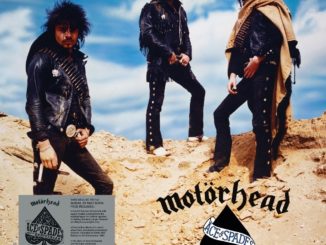

![]()
Did anyone really know Lemmy? That I guess is the question you have to ask…
I met him twice, both briefly, and both times as he signed autographs for me and as mass of other young kids. I can’t really remember what he grunted the first time but the second time I remember we got what you might even consider a bit of advice (though I forget the exact question I only remember his answer): “Find something you’re good at and enjoy and keep doing it as well as you can”.
In a way that is how I’ll always remember Lemmy – for being Lemmy. And bloody good at it he was too…
Mick Wall gets somewhere to unwrapping the mystery of the man few got close to but in the end really it’s not something we all necessarily want to know, Lemmy the legend is just fine frozen in time and this book gives us a great series of snapshots over the years .
I always found Lemmy quintessentially English, a great British character, an eccentric maybe, but with a wit and wisdom on a level that Rock Stars weren’t meant to attain. At school I once wrote about the man in an essay entitled “Lemmy – Do you ultimately see him as a tragic or a heroic figure?” There we were reading Shakespeare’s Hamlet and listening to Ace of Spades and I thought ‘you know what? Shakespeare could find a Hamlet in that guy… It was a thought I hadn’t recalled in years till Lemmy died on 28th December last year.
Name a Rock Star that comes close?
Enough of my memories though on onto Mick Wall’s page-turningly good book. With any biography it’s always interesting to see the breakdown – pre-fame, fame, peak of fame and the slide and normally it cuts pretty much the same way – plenty of back ground, an emphasis on the glories and a quick run through the rest and so it is will Lemmy, as the last thirty years rush by in a flash. And that I guess is part of the story we shouldn’t forget.
If you like your history then the first half of the book is a riveting read, part rite of passage, part child of the times, part finding the components that made the man and never changed. Lemmy the recipe might well be: Rock and Roll, Speed, Women and Hard Liquor, all balanced all to excess and none ever leaving him till the end.
The Rocking Vickers and Hawkwind may have shaped him to some extent but you always felt that it was as the ultimate outlaw in Motörhead that he found that thing he was really good at, did it well and stuck to it. And as the three amigos and the real magic came and went the legend grew. I remember every release, I was in awe of the fact that no one had a bad word to say about the man, past band members excluded. It was a time of patched denim jackets, bullet belts and images of Lemmy sat by a fruit machine in dressing rooms or pubs, blissfully not giving a fuck about anything but the spinning reels and the next drink.
I remember when ‘No Sleep Till Hammersmith’ hit number 1 on the charts and the remarkably poor ‘Iron Fist’ album that followed and reading about Lemmy collapsing at biggest show of his career as if on cue, it’s all here and hard to believe it’s all a distant 35 years past where the legend started to form: the other man in black.
The fact that Lemmy was a speed freak didn’t seem to register with us kids, after all he looked well enough on it and you didn’t even contemplate what he had to eat between Jack and Cokes or his next hit, it was all remarkably discrete in that most English of ways. Here was a man who had it all, a bloke as seemingly ordinary as all of us who didn’t care about money just what was in his pocket.
Then there were the celebrity years after the classic line up of Motörhead had started to implode and drift into his rear-view mirror: Wendy ‘O’ Williams and The Nolans seemed like unfocussed fun (though these days it would have been seen as genius and lapped u by the celebrity obsessed media). All Fast Eddie wanted was Motörhead to play the blues, but Lemmy was content to let it all slip, have fun and lose his way. You wonder if he had regrets but if he did he never admitted to them.
With Eddie gone the rather rapid decline started for Motörhead, the press dried up, and in those pre-internet days the music papers were your only lifeline. Brian Robertson joined, pissed everyone off and the decline was suddenly in full tilt. A European tour was cancelled with a doctor’s note to appease the insurers (yes that still happens these days when you don’t shift tickets) and then Phil Taylor jumped less than a year later and the one amigo remained.
The Phil Campbell and Wurzel period came and went, Phil came back and left again, long standing manager Doug Smith was turfed out and Phil Carson took over relocating Lemmy to L.A. and his years at The Rainbow in the process. That was 25 years ago and its only 85 pages that are left to cover those remaining years. That sort of says it all. All that was left was Lemmy the man, Lemmy the legend and a band that recycled its sound to ever decreasing returns.
There are surprises though in those remaining pages, but most of the real Lemmy is still shrouded in darkness, lost in the background as the legend holds the main stage. Who knew that Lemmy had a semi-regular girlfriend for the last 20 or so years? It’s an astonishing attachment for a man you feel lost the only real love of his life – Suzie in 1973 (who died of a heroin overdose). And it’s here you start to surmise but no one asks Lemmy the question and if they did he’d certainly deny it. Was it a life of addiction to blunt the pain, or a stubbornness to refuse to let the hand the world dealt him affect him in any way. It’s interesting in the later pages as Lemmy rails against those trying to save the planet and there’s more than a grain of truth in what he says and a telling quote about the insignificance of mankind. Not exactly a philosophy but the shadow of one at the least.
Wall does do the final part of the book rather well too, opening up enough hints, allegations and things left unsaid to make you wonder if we will ever know Lemmy at all, or just the legend. But we do learn some things both the rather obvious – that Lemmy definitely was not gay, to the bizarre – he was an ordained minister! (That could have come in handy on his birthday trips to Vegas surely).
Both Wall’s book and Lemmy the movie also touch on an important truth – the ordinariness of Lemmy’s later life – from cooking chips (though I suspect that was staged) to a visit to a record store to his hogging the bar at the Rainbow where I have my only other Lemmy anecdote. As a regular visitor to the states and always through L.A. usually on the road to gigs and Festivals I always stopped off at the Rainbow in the hope of seeing the great man, in seven years I never did, he was always on tour or just never there so I once sat down and played the quiz machine there. On a beautiful run of questions I top scored and putting my name in the leaderboard saw that every other name on it read ‘Lemmy’. Two weeks later on the way back home I called in again, and again Lemmy wasn’t in the building, but I sat down by the quiz machine again only to read the leaderboard showing ‘Lemmy, Lemmy, Lemmy, Lemmy’ my name was gone and there were only four names on there. I asked the barmaid about it and she said oh yeah he sat there yesterday for a few hours and couldn’t wipe you off the board so he pulled out the plug! And that I guess will be my one endearing memory – just what I would have done, but shit I would have loved to have played that machine with him! More tellingly for me the name I’d typed into the machine was ‘Mtrhd’…
In a world where vacuous celebrities have nothing to say and seemingly just exist to amass tweets and dollars, Lemmy could always be relied on for a quote and however unfashionable his answers. He really didn’t care what anyone thought of him, it just didn’t matter he was never going to change his ways and no matter what you thought of ‘One armed bandits’ he loved them, no matter how worrying you thought his collection of Third Reich memorabilia was you could see in his eyes the appreciation of the craft of the artefacts. In a world obsessed with health he always had his fags (cigarettes to our American friends) and Jack. He may have been flawed, but then we all are aren’t we – and what he had was integrity, a steadfast defence of what he loved and what made him, whether it be the Rock and Roll of Little Richard, Elvis and Jerry lee Lewis or his steadfast refusal to regroup the classic Motörhead line-up. He also hated to disappoint the fans even at the cost of his health.
Where else can you visit and see a rock star at a bar happy to pose for photos and let you buy them a drink? A man of the people but always a loner. Maybe it all does go back to being abandoned by his father, abandoned again when the love of his life died? Maybe that was why he was so detached, but one thing’s for sure that was at least part of why he became Lemmy.
So what would be his epitaph? Over the years he loved certain phrases and one I’ve seen a dozen times on camera and at least twice in his movie is the classic English line: “You can’t have everything can you? Where would you put it?” (A phrase often attributed to Steven Wright but something my grandfather used to say years before) It may be lost on some but it was definitely a phrase he hung onto over the years. At the end of the day though I guess the more obvious final word might be “That’s the way I like it baby I don’t want to live forever. Win some lose some it’s all the same to me”…
Wall’s book is a damned good read, you can feel the affection for his old mate and that always makes the best of biographies. One day someone may dig a little deeper, though what really went on inside that head of his Lemmy took with him when Ian Kilmister died.
God bless Lemmy. R.I.P.



